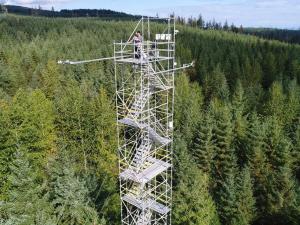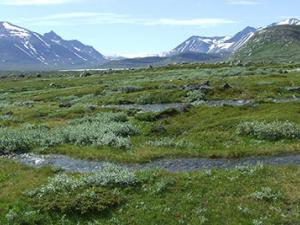

Research Bio
Trevor F. Keenan is an Associate Professor and Chen Chancellors Chair at the Department of Environmental Science, Policy and Management, UC Berkeley, and a Scientist in the Climate and Ecosystem Sciences Division at Lawrence Berkeley National Laboratory.
Over the past two decades, his work has focused on ecosystem carbon sequestration and long-term ecosystem dynamics, as well as related feedbacks to the atmosphere through water use and energy flows. He has a broad interdisciplinary background with formal training in mathematics, ecology and earth system science.
Prof. Keenan's interdisciplinary group at UC Berkeley combines large ecological data sets (e.g., eddy-covariance, remote sensing), mathematical modeling, and machine learning/data assimilation/mining tools, with results from in-situ field studies and experiments, to gain a mechanistic understanding of ecosystem function. The group uses methods from diverse disciplines, including ecophysiology and biogeochemistry, micrometeorology, atmospheric science, mathematics, statistics and high-performance computing.
Read more about the members and work in the Berkeley Keenan Group: https://www.keenangroup.info/
Information about the group's publications: www.keenangroup.info/publications.html
Research Expertise and Interest
global change, natural climate solutions, Dynamic Vegetation, carbon cycle, ecophysiology, land-atmosphere interactions, biogeochemistry, micrometeorology, remote sensing, mathematics and data science
In the News
Quantifying the Strength of the Land Carbon Sink
Plants Buy Us Time to Slow Climate Change – But Not Enough to Stop It
NSF awards $2 million to the FLUXNET Coordination Project
Climate change has the Arctic seeing green
Featured in the Media
As the Arctic warms and previously barren land turns green, a team of Berkeley scientists has come up with a way to calculate the magnitude of change. Led by assistant environmental science, policy, and management professor Trevor Keenan, who has a joint appointment at the Lawrence Berkeley National Laboratory, the researchers have found that 16 percent of the land that used to be too cold for extensive plant growth is now warm enough for vegetation. By 2100, they estimate that only 20 percent of the northern hemisphere's vegetated land will be hampered by cold temperatures. "Although the greening might sound like good news as it means more carbon uptake and biomass production, it represents a major disruption to the delicate balance in cold ecosystems," Professor Keenan says. This story originated at Berkeley News.




